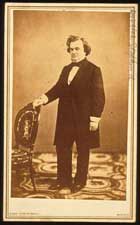Stephen
A. Douglas (1813-61)
 |
|
Stephen
A. Douglas, 1860
|
Like
Abraham Lincoln, Stephen A. Douglas moved west as a young
man. Born and educated in Vermont, he settled first in New
York State, and then moved to Jacksonville, Illinois, in 1833.
He was admitted to the bar and rose rapidly in Democratic
party politics, serving in the state legislature and Congress
and winning election to the Senate in 1847.
Douglas
was the last great political leader to build a career on sectional
compromise. It was he, more than any other legislator, who
shepherded the Compromise of 1850 through Congress. Douglas
soon emerged as the nation's most powerful statesman.
Popular
sovereignty, the principle with which Douglas's career became
identified, sought to remove the divisive slavery issue from
national politics. Only this, he believed, would keep sectional
antagonism from destroying the Democratic Party and the Union,
while encouraging the rapid settlement and development of
the West. Douglas's failure to reach the presidency or to
hold the Democratic Party together indicated that sectional
compromise was no longer possible.
During
the secession crisis, Douglas warned Southerners that Northern
Democrats would stand with the federal government in a civil
war. He died in June 1861, soon after pledging his support
to Lincoln's efforts to resist the Southern rebellion.


